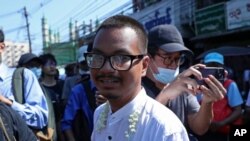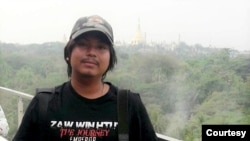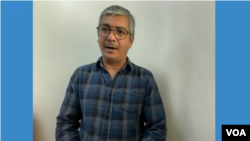"I just want my mother back," Kaung Sett Lin told reporters outside Insein Prison in Yangon on January 4. He was among the nearly 10,000 prisoners released during a mass amnesty announced by the ruling junta on Myanmar’s Independence Day on January 4.
"My mother passed away eight months ago while I was in prison," Kaung Sett Lin told VOA in a recent interview. "She died at the age of 48 from cancer. The last time I saw her, or the rest of my family, was when I appeared in court for sentencing in December of 2022."
The junta had, until recently, stopped all prison visitation since the onset of the COVID-19 pandemic.
The 30-year-old journalist faced charges under article 505(a) of the penal code, a broadly worded provision penalizing incitement and the spreading of "false news." Despite being released under the banner of amnesty, "In fact, I had already completed my two-year sentence," Kaung Sett Lin said.
Kaung Sett Lin was sentenced to three years in prison in December 2022. However, according to Myanmar law, prisoners are eligible for multiple sentence reductions.
Since the military coup on February 1, 2021, at least 176 journalists have been arrested, and four killed, with as many as 50 still in jail or in police detention according to the International Federation of Journalists’ 2023 report.
Tragic day on Pan Pin Gyi Street
Kaung Sett Lin and his fellow photojournalist and friend Hmu Yadanar Khet Moh Moh Tun, both with the independent Myanmar Pressphoto Agency, were arrested in December 2021 along with about 15 protesters while covering a coup protest in Yangon.
While the protest was taking place on Pan Pin Gyi Street in Kyi Myin Daing township, junta soldiers reportedly rammed into the crowd of young protestors with a truck, injuring several, including the two journalists.
"A military vehicle careened into us unexpectedly," Kaung Sett Lin told VOA. "We started running and helping young protesters to flee when the military opened fire on the crowd."
The vehicle then began swerving as it cut through the crowd, hitting him and crushing his colleague under its wheels, he said. "Hmu Yadanar was dragged by the truck and her entire body bore the weight of the military vehicle. I was then thrown into a nearby concrete wall and lost consciousness."
Kaung Sett Lin suffered a broken back and leg, as well as serious head and eye injuries. His colleague would suffer even more severe injuries, having been run over by the military truck. "Her whole body and her legs were completely crushed," he said.
"We were later taken to Military Hospital No. 2 in Yangon, where we were initially treated, but we didn’t receive the long-term intensive treatment we needed."
As a result, according to Kaung Sett Lin, the two were forced to suffer from their injuries while languishing in prison. "Especially Hmu Yadanar. She ended up disfigured by scars on her face and head," he said.
Kaung Sett Lin claims their injuries were not sufficiently treated in prison, leading to a worse outcome. According to her family members, the young female journalist would go on to have several bones replaced with steel rods in her legs and would need crutches to walk.
After spending a year in prison, recovering from their injuries, the two journalists were both sentenced under article 505(a), a broad provision that criminalizes incitement and the dissemination of false news.
Kaung Sett Lin and his colleague received three-year sentences. However, Hum Yadanar Khet Moh Moh Tun was sentenced in May 2023 to an additional 10 years on a terror charge. She was accused of supporting People Defense Forces, who are engaged in an armed revolution against the coup. She was charged under section 50(j) of the Counter Terrorism Law, a provision related to terror financing.
Kaung Sett Lin said he last saw his colleague when they appeared in court for their sentencing hearing in December 2022.
"The junta did not want to release Hmu Yadanar from prison," he told VOA. "They lied about the case and unjustly sentenced her to a long prison term. I think that the junta did not want the public to see the disfigured face of Hmu Yadanar because of the injuries they inflicted on her."
Voices from the front line
Despite the risks, Kaung Sett Lin still sees it as his mission to document the brutality of the junta and the bravery of the young protesters.
"We hope [the] international community recognizes that we have been able to obtain the right information, and to get it out to the world," he said. "No matter what kind of oppression or violence we face under the military coup, we, as journalists, will continue to do our job."
Nathan Maung, an American journalist of Burmese descent, spoke to VOA via Zoom recently. "It's disheartening to acknowledge that as the military's failed coup approaches its third year, individuals wielding cameras in our country, especially those recording the sounds of life, face threats to their lives and the lives of citizens, including journalists," he said.
"They stand at risk of being killed on the spot, whether holding a camera, facing gunfire, or being struck by a car and losing their lives."
Maung endured 98 days in detention in 2021, after junta soldiers raided his Yangon-based newsroom. He says he was tortured during the initial interrogation process. He was later released and deported to the United States.
Journalists in Myanmar face the real possibility of being killed for simply doing their job, Maung said. "On a daily basis, they face many kinds of threats on the streets. Then there are the frequent detentions by junta soldiers. They can be interrogated at any time and for any reason, and even tortured."
Ongoing struggle of Myanmar's journalists
Research by the VOA Burmese Service indicates about 40 journalists are still being held in prisons across Myanmar, even after the recent mass pardon.
Among the journalists still held by the junta is VOA contributor Sithu Aung Myint, sentenced to 12 years in prison. Sithu Aung Myint had been providing news analysis to a VOA Burmese weekly program until his arrest in August 2021.
"Losing their parents and not being allowed to attend their funerals, not being permitted to see their loved ones, losing friends. All of this is the heavy price journalists are paying in Myanmar," Maung told VOA.
"This struggle is taking a toll on all of us as Burmese people. One day, this will all be over, and we will finally be able to tell our story. We will be able to share the story of how we endured this with the whole world. We are waiting for that day."







